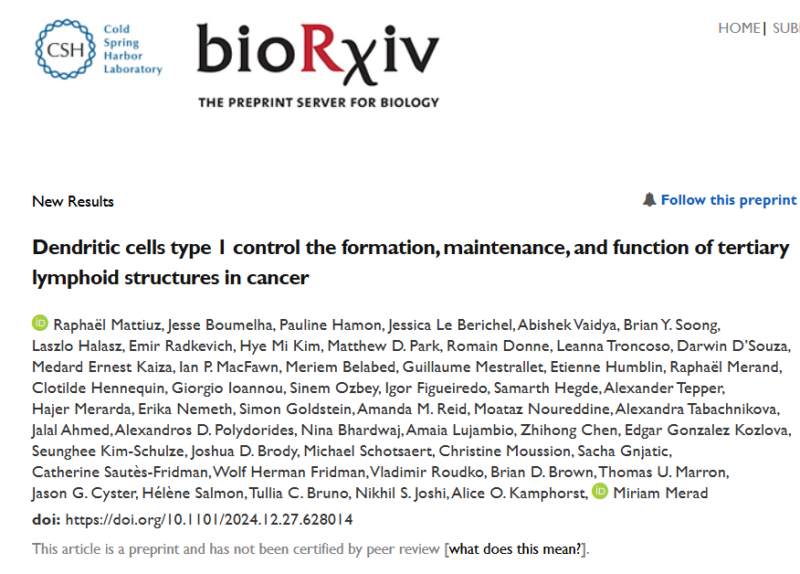
James Crowley: Elevated expression of CCR7 is generally indicative of poor prognosis in cancers
James Crowley, Professor of Medicine Emeritus at Brown University, shared a post on LinkedIn by John Gordon, Professor Emeritus at the University of Birmingham, adding:
“Elevated expression of CCR7 is generally indicative of poor prognosis in cancers. But in lung cancers, CCR7 expression has been reported to correlate with a better prognosis.
The study posted below provides possible insights into why that may be the case: enhanced conventional dendritic cell migration into CCR7 ligand-enriched stromal hubs that maintain and renewing tertiary lymphoid structures.
In a novel NSCLC murine lung cancer model, CCR7 ligand-enriched stromal hubs were critical in maintaining and renewing the tertiary lymphoid structures.
These include B cell follicles and T cell regions, and disruption of conventional dendritic cell migration into these CCR7 stromal hubs reduced tumour antigen presentation to T4 and T8 lymphocytes and altered the continued maintenance of these tertiary lymphoid structures.”
Quoting John Gordon’s post about a recent paper by Raphaël Mattiuz et al. published in bioRxiv:
“Breaking Study on Dendritic Cells Type1 control the formation, maintenance, and function of Tertiary Lymphoid Structures in Cancer.
Targeting of cDC1s to enhance TLS function and boost Immunotherapy treatment modalities.
Tertiary lymphoid structures (TLS) are organized immune cell aggregates that arise in chronic inflammatory conditions. In cancer, TLS are associated with better prognosis and enhanced response to immunotherapy, making these structures attractive therapeutic targets. However, the mechanisms regulating TLS formation and maintenance in cancer are incompletely understood.
Here, using spatial transcriptomics and multiplex imaging across various human tumors, Miriam Merad, MD, PhD and Co. found an enrichment of mature dendritic cells (DC) expressing high levels of CCR7 in TLS, prompting them to investigate the role of DC in the formation and maintenance of TLS in solid tumors.
To address this, they developed a novel murine model of non-small cell lung cancer (NSCLC) that forms mature TLS, containing B cell follicles with germinal centers and T cell zones with T follicular helper cells (TFH) and TCF1+PD-1+ progenitor exhausted CD8+ T cells (Tpex).
They show that, during the early stages of tumor development, TLS formation relies on IFNγ-driven maturation of the conventional DC type 1 (cDC1) subset, their migration to tumor-draining lymph nodes (tdLN), and recruitment of activated T cells to the tumor site.
As tumors progress, TLS maintenance becomes independent of T cell egress from tdLN, coinciding with a significant reduction of cDC1 migration to tdLN. Instead, mature cDC1 accumulates within intratumoral CCR7 ligand-enriched stromal hubs.
Notably, timed depletion of cDC1 or disruption of their migration to these stromal hubs after TLS are formed alters TLS maintenance.
Importantly, we found that cDC1-mediated antigen presentation to both CD4+ and CD8+ T cells and intact CD40 signalling, is critical for the maintenance of TLS, the preservation of the TFH cell pool, the formation of germinal center and the production of tumor-specific IgG antibodies.
These findings underscore the key role of mature cDC1 in establishing and maintaining functional TLS within tumor lesions and highlight the potential for cDC1-targeting therapies as a promising strategy to enhance TLS function and improve anti-tumor immunity in patients with cancer.”
Authors: Raphaël Mattiuz et al.

More posts featuring James Crowley and John Gordon.
James P. Crowley is a Professor of Medicine Emeritus at Brown University and serves as a volunteer physician at the Rhode Island Free Clinic. He has held leadership positions in the medical community, including past President of the Rhode Island Medical Society and the last President of The Providence Medical Association.
-
Challenging the Status Quo in Colorectal Cancer 2024
December 6-8, 2024
-
ESMO 2024 Congress
September 13-17, 2024
-
ASCO Annual Meeting
May 30 - June 4, 2024
-
Yvonne Award 2024
May 31, 2024
-
OncoThon 2024, Online
Feb. 15, 2024
-
Global Summit on War & Cancer 2023, Online
Dec. 14-16, 2023
